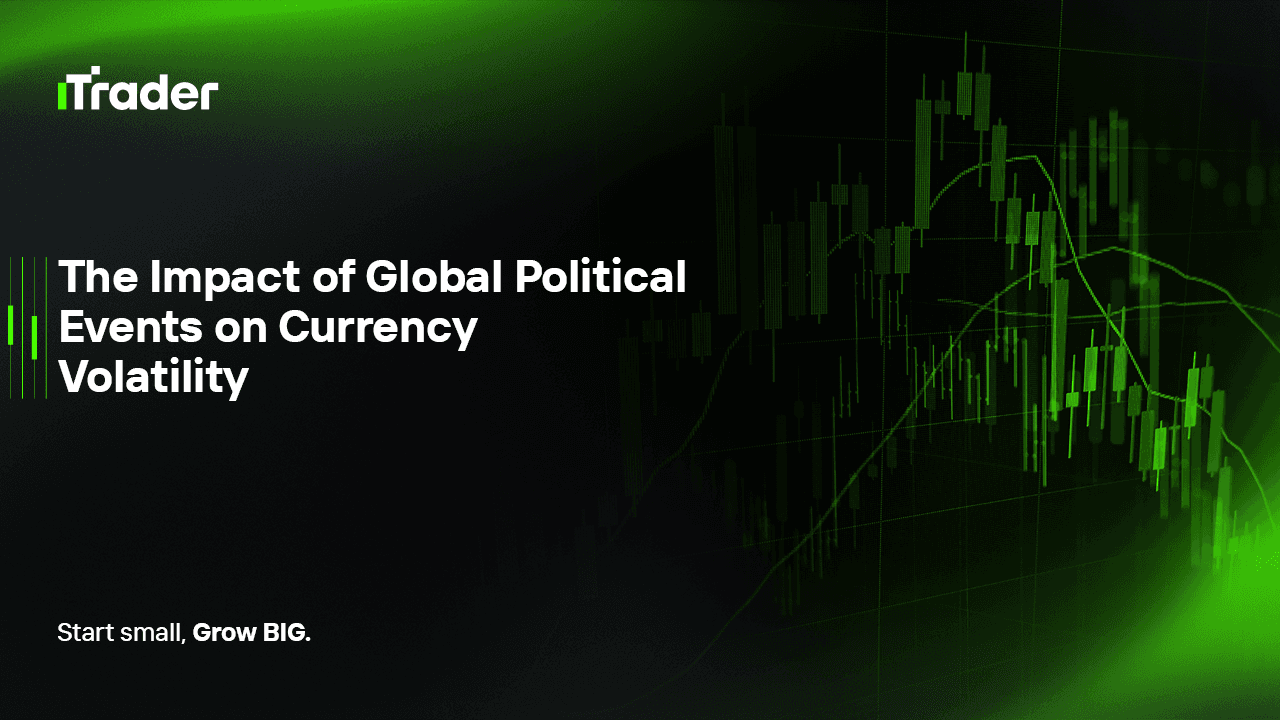2025-07-04
success depends not only on technical setups and statistical edges but also on navigating the unpredictable terrain of global political events. Geopolitical turmoil, policy changes, and election cycles often catalyze sharp movements in currency pairs, shifting sentiment faster than any economic report can. While volatility creates opportunity, it also amplifies risk — making it imperative for proprietary traders to understand and prepare for the political forces that drive the markets.

This blog explores how political events shape currency volatility and how forex prop traders can strategically position themselves before, during, and after such events.
AI Summary:
How do global political events influence forex markets? Political instability, elections, wars, sanctions, and policy shifts significantly affect currency volatility. Prop traders must learn to anticipate and hedge against these events using scenario analysis, volatility-based sizing, and adaptive risk management to stay ahead in dynamic markets.
Unlike equities or commodities, currencies are relative instruments — they reflect the comparative strength of two economies. When politics threatens the perceived stability or growth of one country, its currency reacts immediately.
Key mechanisms include:
Sudden shifts in power or uncertain outcomes (e.g., contested elections) cause dramatic repricing of risk. Market participants re-evaluate fiscal and monetary policy projections based on new leadership.
Armed conflict, especially involving major economies or key commodity-producing regions, drives risk-off flows and commodity currency weakness.
When nations impose sanctions or cut diplomatic ties, financial systems are disrupted. FX markets quickly respond to anticipated economic fallout.
Unexpected referendums (like Brexit) or sweeping policy proposals (currency pegs, capital controls) create large gaps and erratic movements.
The reaction is rarely linear — often it unfolds in phases:
Prop traders thrive on movement. Events like political surprises can provide strong directional moves or mean-reversion setups if reactions are overblown.
Unexpected gaps and slippage become more common. Strategies dependent on tight spreads, like scalping, may become unviable during these periods.
Some pairs may become untradable during crisis moments, with brokers widening spreads or suspending execution.
Avoid static lot sizes. Use ATR or implied volatility-adjusted risk models to scale down during uncertainty or widen stops.
Create event trees outlining possible outcomes and their probable market reactions. Pre-event straddles (long vol positions) may benefit from surprise outcomes.
Understand correlations — during crisis, USD, JPY, and CHF often strengthen. Commodity-linked currencies (AUD, NZD, CAD) may suffer.
Don't chase gaps or enter without volatility-adjusted risk. Let price action confirm sentiment shifts before committing.
In 2018, political tensions between the U.S. and Turkey — compounded by domestic economic mismanagement — triggered a dramatic collapse of the Turkish lira (TRY).
Lesson: Political risk is real and can become terminal without disciplined sizing and risk caps.
Forex prop traders should integrate the following tools into their playbook:
Not all political events impact the market equally. For effective trade management, prop traders should classify political risks into three levels:
Tier 1 includes scheduled events like elections or central bank speeches. These are known in advance, allowing traders to plan scenarios, adjust size, or trade volatility breakouts.
Tier 2 covers unexpected geopolitical shocks — such as wars or terrorist attacks — that cause sudden volatility spikes. In such cases, reducing exposure and waiting for stabilization is key.
Tier 3 involves long-term structural shifts like sanctions or coups. These require reassessing correlations and macro trends, as they can reshape currency behavior over months or years.
This tiered approach helps traders respond with strategy, not emotion — turning uncertainty into opportunity while protecting capital.
For prop traders, ignoring political risk is a recipe for exposure. But harnessing it — with discipline, strategic foresight, and adaptability — can offer rare windows of asymmetric opportunity. The key lies not in predicting the political event itself, but in anticipating market behavior in response to it. By doing so, traders not only protect capital but also capitalize on volatility that others fear.
In forex, politics is not just background noise — it is a primary driver of price.
© 2025 iTrader Global Limited | หมายเลขทะเบียนบริษัท: 15962
iTrader Global Limited ตั้งอยู่ที่ Hamchako, Mutsamudu, เกาะปกครองตนเอง Anjouan, สหภาพคอโมโรส และได้รับใบอนุญาตและอยู่ภายใต้การกำกับดูแลของคณะกรรมการหลักทรัพย์แห่งคอโมโรส ภายใต้หมายเลขใบอนุญาต L15962/ITGL
iTrader Global Limited ดำเนินการภายใต้ชื่อทางการค้า “iTrader” และได้รับอนุญาตให้ดำเนินกิจกรรมการซื้อขายฟอเร็กซ์ โลโก้ เครื่องหมายการค้า และเว็บไซต์ของบริษัทเป็นทรัพย์สินเฉพาะของ iTrader Global Limited
บริษัทย่อยอื่น ๆ ของ iTrader Global Limited ได้แก่ iTrader Global Pty Ltd หมายเลขทะเบียนบริษัทออสเตรเลีย (ACN): 686 857 198 โดยบริษัทนี้เป็นตัวแทนที่ได้รับอนุญาต (หมายเลขตัวแทนบริการทางการเงินของออสเตรเลีย (AFS): 001315037) ของ Opheleo Holdings Pty Ltd (ใบอนุญาตบริการทางการเงินของออสเตรเลีย (AFSL): 000224485) ซึ่งมีที่อยู่จดทะเบียนอยู่ที่ Level 1, 256 Rundle St, Adelaide, SA 5000 ข้อจำกัดความรับผิดชอบ: นิติบุคคลนี้ไม่ใช่ผู้ออก และไม่รับผิดชอบต่อผลิตภัณฑ์ทางการเงินที่ซื้อขายบนหรือผ่านเว็บไซต์นี้
คำเตือนความเสี่ยง: การซื้อขาย CFD มีความเสี่ยงสูงต่อการสูญเสียเงินทุนอย่างรวดเร็วเนื่องจากเลเวอเรจ และอาจไม่เหมาะสมกับผู้ใช้ทุกคน
การซื้อขายกองทุน CFD และผลิตภัณฑ์ที่มีเลเวอเรจสูงอื่น ๆ ต้องการความรู้เฉพาะทาง
จากผลการวิจัยพบว่า 84.01% ของผู้เทรดที่ใช้เลเวอเรจประสบกับการขาดทุน
โปรดตรวจสอบให้แน่ใจว่าคุณเข้าใจความเสี่ยงทั้งหมด และพร้อมที่จะสูญเสียเงินทุนก่อนที่คุณจะเข้าร่วมการซื้อขายที่มีเลเวอเรจ
iTrader ขอประกาศว่า บริษัทจะไม่รับผิดชอบต่อความเสี่ยง ความเสียหาย หรือการสูญเสียใด ๆ ที่เกิดขึ้นจากการซื้อขายแบบมีเลเวอเรจต่อบุคคลหรือนิติบุคคลใด ๆ ทั้งสิ้น
ข่าวสารและข้อมูลที่ปรากฏบนเว็บไซต์นี้มีไว้เพื่อวัตถุประสงค์ทางการศึกษาเท่านั้น ผู้ใช้ควรตัดสินใจทางการเงินอย่างอิสระและโดยใช้ข้อมูลอย่างรอบคอบ
ข้อจำกัด: iTrader ไม่ได้มุ่งเป้าเว็บไซต์หรือบริการไปยังผู้อยู่อาศัยในประเทศที่กฎหมายหรือข้อบังคับห้ามไม่ให้มีการทำธุรกรรมดังกล่าว
หากคุณอาศัยอยู่ในเขตอำนาจที่การใช้เว็บไซต์หรือบริการนี้ถูกจำกัด คุณต้องรับผิดชอบในการปฏิบัติตามกฎหมายท้องถิ่น
iTrader ไม่รับประกันว่าเนื้อหาบนเว็บไซต์ของบริษัทจะเหมาะสมหรือถูกต้องตามกฎหมายในทุกพื้นที่